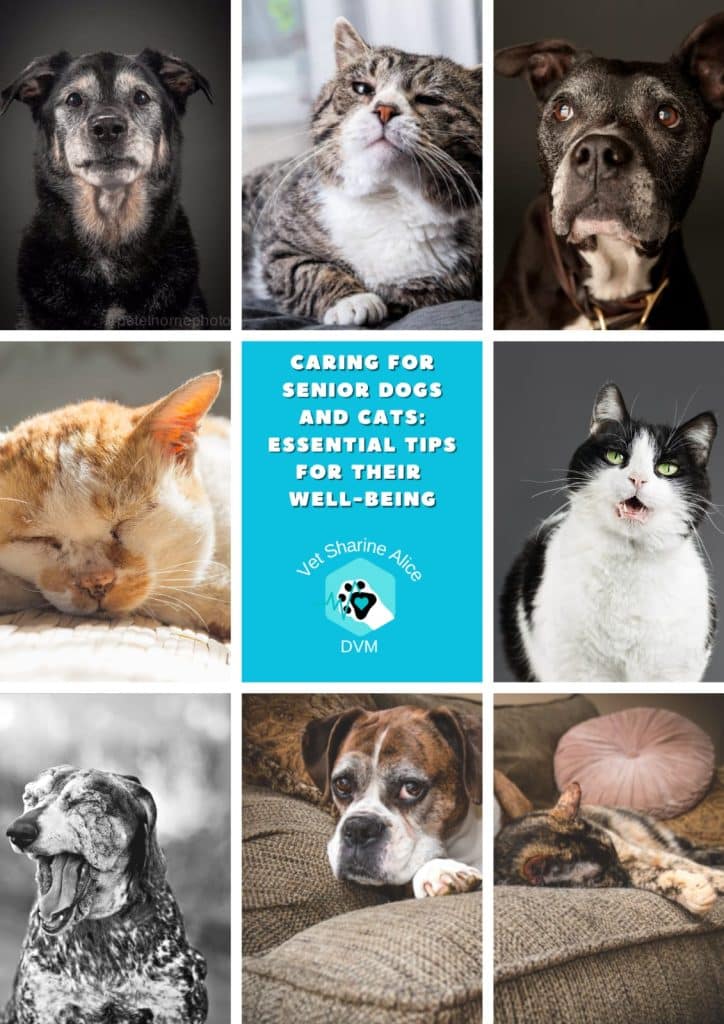As our beloved pets grow older, their needs change, requiring special attention and care to ensure their quality of life. Dogs and cats are considered seniors around the age of 7, although this varies by breed and size. In this article, we’ll explore the most important aspects of caring for aging pets, from nutrition and exercise to veterinary check-ups and comfort adjustments at home.

1. Veterinary Care: Regular Check-Ups Are Essential
Senior pets are more prone to chronic diseases such as arthritis, kidney disease, heart problems, and diabetes. Regular veterinary visits—at least every six months—are crucial to detect and manage health issues early. Blood tests, urine analysis, and dental exams should be part of their routine care.
Key Veterinary Considerations:
Annual or biannual bloodwork to detect early signs of disease.
Dental check-ups to prevent infections and pain.
Monitoring of weight and mobility to adjust their lifestyle accordingly.
Vaccination and parasite control, as their immune system weakens with age.
2. Nutrition: A Balanced Diet for Aging Bodies
Senior pets have different nutritional requirements. Some may need food with fewer calories to prevent obesity, while others might require higher protein intake to maintain muscle mass. Joint-supporting nutrients like glucosamine, omega-3 fatty acids, and antioxidants are beneficial.
Diet Tips:
Choose age-appropriate food formulas.
Ensure they stay hydrated—older pets may drink less water, increasing the risk of kidney issues.
Consider supplements for joint health, cognitive function, and digestive support.
Feed smaller, more frequent meals to aid digestion.
3. Joint and Mobility Support
Arthritis and joint stiffness are common in senior pets. Providing a comfortable and supportive environment can significantly improve their mobility and reduce pain.
Ways to Support Mobility:
Orthopedic beds to reduce joint pressure.
Non-slip rugs or mats to prevent falls.
Ramps or stairs for easier access to sofas, beds, or cars.
Moderate, low-impact exercise like short walks or gentle play sessions.
4. Mental and Emotional Well-Being
Cognitive dysfunction syndrome (CDS), similar to dementia in humans, can affect aging pets. Symptoms include disorientation, restlessness, altered sleep patterns, and forgetfulness. Mental stimulation is key to keeping their minds sharp.
Ways to Keep Their Minds Active:
Puzzle toys and treat-dispensing games.
Short training sessions with positive reinforcement.
Consistent daily routines to reduce anxiety.
Gentle affection and attention to maintain emotional well-being.
5. Grooming and Hygiene
Senior pets may have difficulty grooming themselves, leading to skin infections, overgrown nails, or matted fur. Regular grooming sessions help maintain their comfort and hygiene.
Grooming Tips:
Brush their fur frequently to prevent matting and stimulate circulation.
Trim nails regularly to avoid mobility issues.
Clean their ears and check for infections.
Monitor skin for lumps, sores, or signs of irritation.
6. Creating a Comfortable Home Environment
Older pets may become more sensitive to temperature changes and environmental stressors. Adapting their living space can make a big difference in their comfort.
Home Adjustments:
Provide warm bedding away from drafts.
Ensure easy access to food, water, and litter boxes (for cats).
Reduce household stress by maintaining a calm atmosphere.
Consider pheromone diffusers or calming music for anxious pets.
7. Quality Time and End-of-Life Care
As pets age, our bond with them deepens. Ensuring they feel loved, comfortable, and pain-free in their final years is the best gift we can give them. Discuss palliative care options with your veterinarian if needed and prioritize their well-being above all else.
Final Thoughts
Caring for a senior dog or cat requires patience, attention, and love. By providing proper medical care, a balanced diet, mental stimulation, and a comfortable environment, you can help your furry friend enjoy their golden years with dignity and happiness.
For professional veterinary guidance tailored to your pet’s specific needs, feel free to contact Dr. Sharine Alice, VMD at (506) 8307-8400 in Playa Hermosa, Guanacaste.
https://meet.google.com/call?authuser=0&hl=en&mc=KAIwAZoBFDoScGludG9fcXBxODdzYjhxMm9oogE7GgIQADICUAA6AhABSgQIARABWgIIAGoCCAFyAggBegIIAogBAJIBAhABmgEEGAEgAKIBAhAA4gECCACyAQcYAyAAKgEwwgECIAHYAQE&origin=https%3A%2F%2Fmail.google.com&iilm=1742931084972







